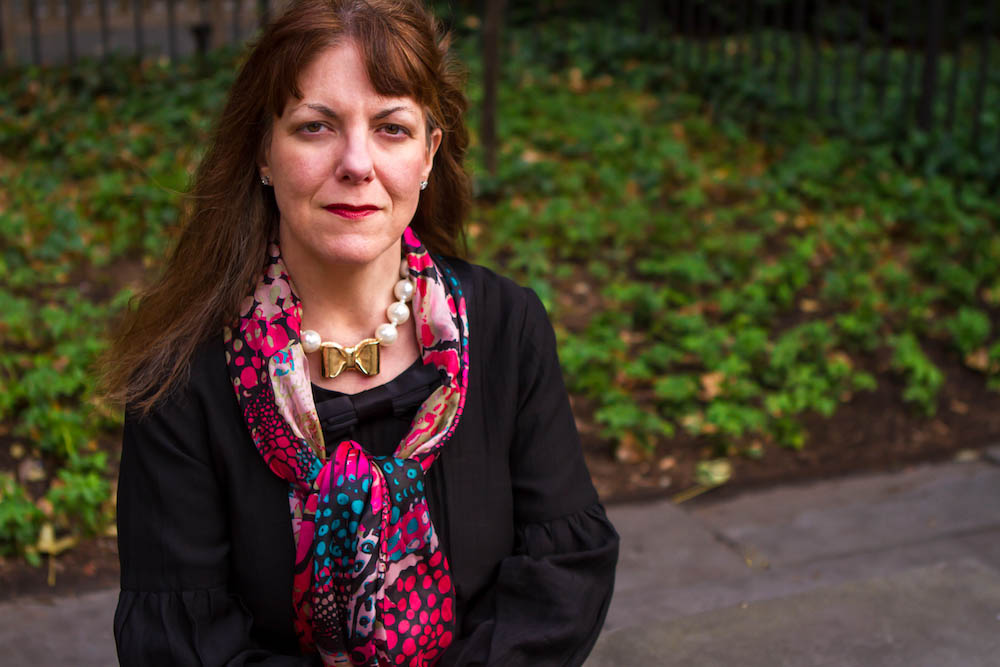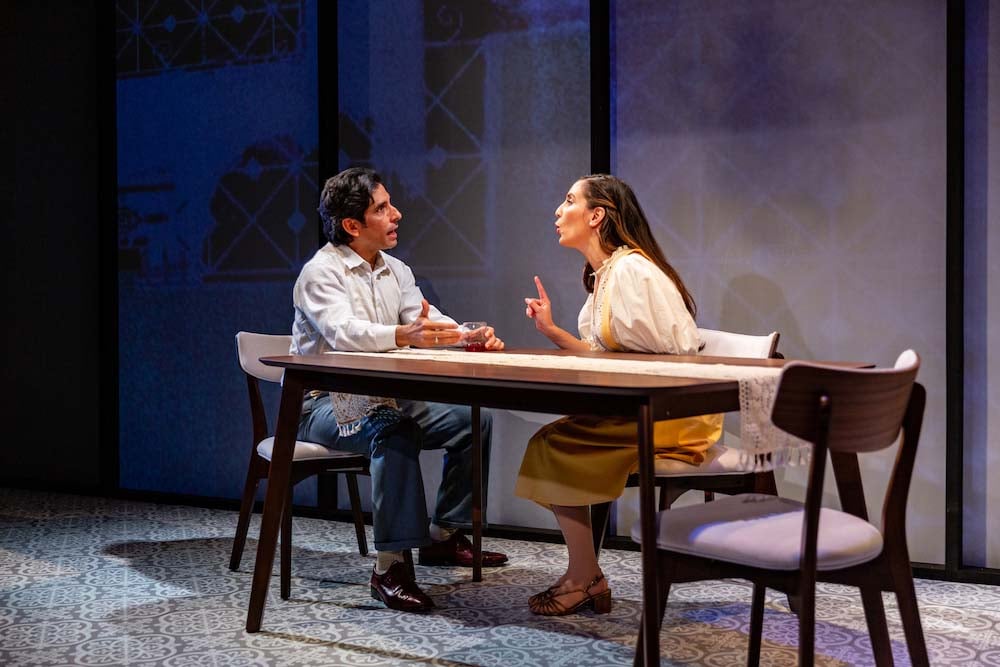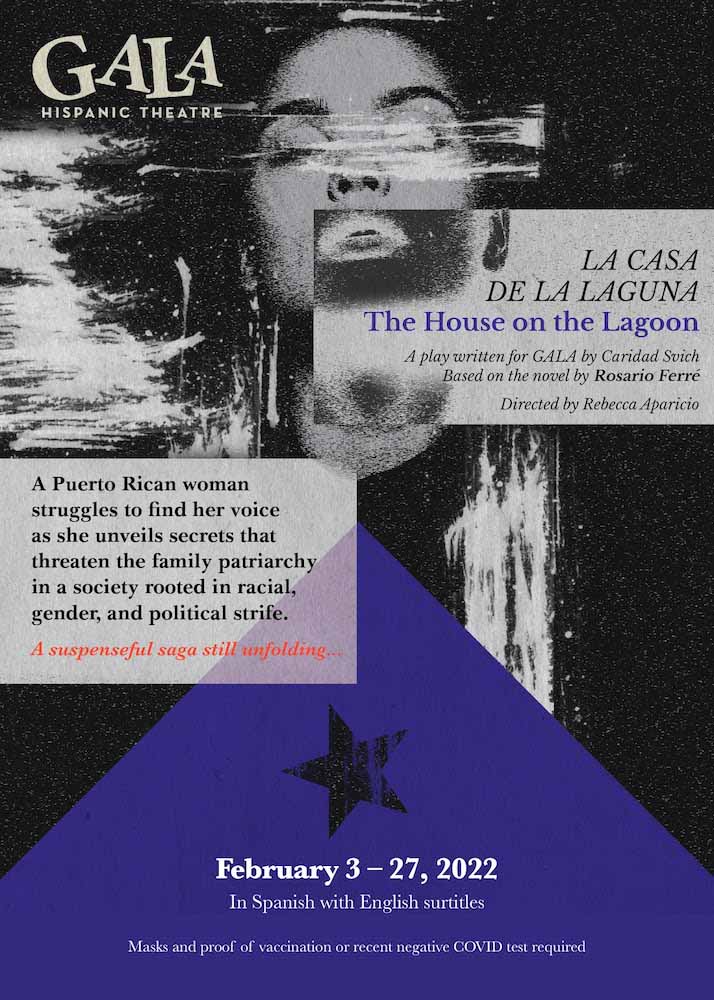A regular DMV theatergoer should know the name Caridad Svich. A prolific writer, adaptor, and translator (as well as critic, editor, publisher, activist, and a member of the theater Twitterati), Svich has been produced at theaters across the region, from Arena Stage to the newly formed ensemble Pan Underground, as well as Theater Alliance, force/collision, 4615 Theatre Company, the Source Festival, Single Carrot Theatre, Factory 449, Georgetown’s Department of Performing Arts, and most frequently GALA Hispanic Theatre, which Svich calls her “DC home.”
Her latest play, an adaptation of Rosario Ferré’s epic novel The House on the Lagoon, recently opened at GALA. Set in Puerto Rico, the layered story covers nearly three decades of life in the Mendizábal household. At its center is Isabel Monfort, a wife, mother, and writer attempting to write the history of her and her husband’s families, who represent many of the island’s historical, cultural, and political divisions. The world premiere production runs through February 27, 2022.

Svich recently Zoomed in from her home in New York City to discuss the play, her relationships to DMV theater and different writing modes, and more.
Chad Kinsman: How did adapting La casa de la laguna (The House on the Lagoon) come about?
Caridad Svich: After La Tía Julia y el escribidor (Aunt Julia and the Scriptwriter) [April 2021], GALA asked if we should do something else, something that would premiere with them. I said, “Awesome!” They wanted a sweeping, multigenerational novel that dealt with Puerto Rico. If you’re going to do that, Rosario Ferré is certainly a good place to start.
We read several options, and GALA loved La casa de la laguna. It’s a fascinating novel stylistically, and its politics are thorny and resonant. That was at the start of the pandemic. I was finishing a commissioned adaptation for Repertorio Español [in New York City], so I was already in adaptation mode.
What does “adaptation mode” involve?
I reread the novel and took a ton of notes. I also reread more of Rosario’s work to get a feel for her sensibilities as a writer, because I have to respond to those in some way. The House on the Lagoon is the first novel she wrote directly in English, before translating back into Spanish. That intrigues me. It’s as if she was discovering her voice as an English-language writer.
Then it’s making the tough decisions that happen in adaptation, because we’re not going to tell the whole story. I had to figure out the heart of the book, which doesn’t reveal itself as easily or as quickly as other pieces I’ve done. This novel has so much going on. There are beautiful and fascinating detours that contextualize the colonialist history of Puerto Rico, and chapters of the novel Isabel is writing, but I feel like the heart is Isabel and the marriage. That’s ultimately the engine of the plot.
In the book, because Isabel is a bit of a stand-in for Rosario, she’s kind of in the shadows. She’s telling the story, but her dramatic drive isn’t as present. So I said, “I have to rescue Isabel.” I put her in the center of the dramatic action. I also wanted to create a great leading role for an actor.

You mentioned the novel’s politics are resonant but also thorny. How so?
The marriage is a metaphor for larger concerns. The repressive regime in the house is indicative of the repressive regimes on the island. It’s done in a beautiful way in the book, and I hope that comes across in the play.
It’s also a story about class. Rosario Ferré comes from one of the wealthiest families in Puerto Rico, and she was writing about her milieu, about the upper class who sheltered themselves from the rest of society. I love that she dared herself as a writer to say, “This is the world I grew up in, and it’s wrong.” She’s critiquing that. The novel is satirical, to a great extent, but I didn’t want to coast on that. I wanted to make sure the play goes into the novel’s emotional underbelly.
The story also deals with the intersections of race and colorism, as well as the ideas of independence, statehood, and Commonwealth, the three things that are, sadly, an eternal question of Puerto Rico.
Does your work as an adaptor and translator influence your original work?
The luxury of [translating and adapting] is you get to step into another writer’s brain. You get to see how they think about theater, theatricality, language, sonority, character, and plot. I see other ways you could do things, so when I go back to my writer’s desk, everybody’s with me. When I’m stuck in a creative problem, I can ask, “How would Calderón de la Barca solve this?” [laughs] It widens the palette of options.
It’s also a breath of fresh air. When you’re working on your own stuff, you get bogged down a little. It’s nice to take a break from yourself and test out new ideas. Then, you can come back to the writing-table feeling empowered and confident, because writing is hard and vulnerable.
Zooming out, what is your relationship with DC, given how many theaters have produced your work?
DC may be one of the cities where I’m most produced, and it sort of happened mysteriously, to me at least [laughs]. I think La casa de los espirtus (The House of the Spirits) [2013] at GALA was my first major [DMV] show, and that might have created some interest in my work in the region. It had a lot of scope and ambition in terms of its subject matter and theatricality. I have to say GALA’s continued commitment to my work has been a blessing.
There’s some really exciting work in DC and adjacent areas. There’s a mix of venue-based companies with higher and lower budgets and this beautiful DIY kind of theater, and I see artists move among them, which is a very healthy thing for the ecosystem.
It’s also a town where politics happens on a daily basis, so there’s a tendency to produce work that speaks to issues of the day, to how people are being taken care of, or not being taken care of, in this world.

Do you see your work as political?
Writing is a political act. The minute you mark the page, you’re saying this matters. I want to shine a light here. The House of Spirits is about capitalism, power, settler colonialism, tyranny, surviving a dictatorship, and gendered violence. Maybe because that was my first big production in the region people were like, “Oh, you write this.”
That’s sometimes a double-edged sword, in that people might not see other sides of my writing voice. I also do fun things, creative and romantic things. Other works show different sides of my writing voice, from literary and performative standpoints.
Is there a play you’d like to see on a DMV stage soon?
It’s hard to pick favorites when you’re a writer, because they all want your love, right? [laughs] But, I’ve written a piece called Chelsea and Ivanka, which, if there’s a place it should be seen, it’s DC. At least initially.
La casa de la laguna (The House on the Lagoon) plays through February 27, 2022, at GALA Hispanic Theatre, 3333 14th Street NW, Washington, DC. The production is presented in Spanish with English surtitles Thursdays through Saturdays at 8 pm and Sundays at 2 pm. Tickets ($48 regular; $35 seniors, students, teachers, and military; $25 patrons ages 25 and under) can be purchased online or by calling 202-234-7174.
GALA is one block from the Columbia Heights Metro station on the Green and Yellow lines. Parking is available at a discount in the Giant parking garage off Park Road NW.
COVID Safety: Masks are mandatory. Proof of vaccination or recent negative COVID-19 test (taken within 72 hours prior to showtime) required for all patrons ages 5+. GALA’s full COVID Safety Policy is here.
La casa de la laguna (The House on the Lagoon) is appropriate for ages 12+.
SEE ALSO:
Hanging in and forging ahead at GALA with theater that matters (interview with GALA Executive Director Rebecca Medrano and Actor Ernesto Concepción by Susan Galbraith)
A stellar cast plays a Puerto Rican family in GALA’s ‘House on the Lagoon’ (review by Susan Galbraith)
GALA’s daring and diverse new season to tackle freedom (season announcement)





